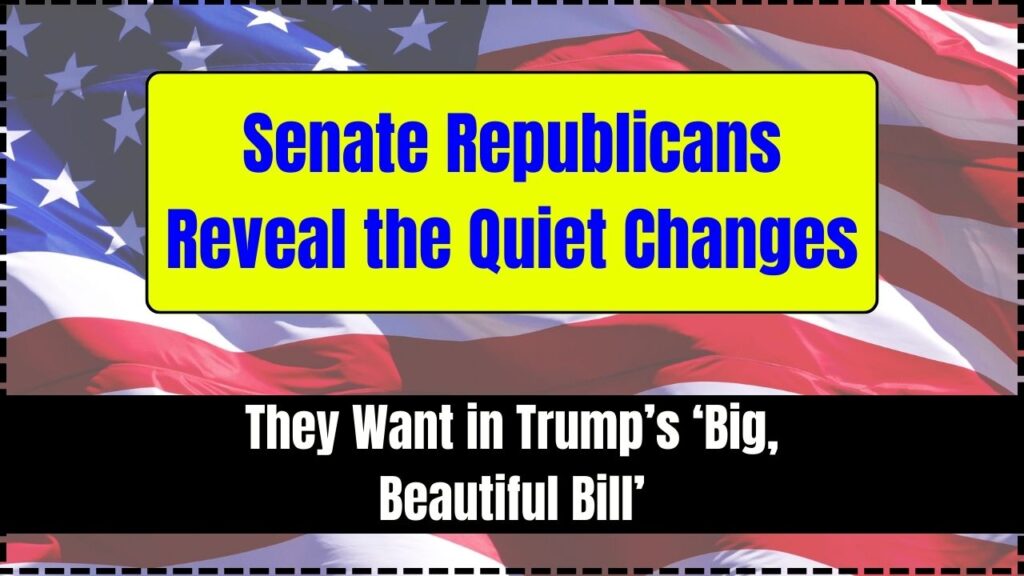Senate Republicans Reveal the Quiet Changes: President Donald Trump’s ambitious legislative package, the “One Big Beautiful Bill Act” (OBBBA), has successfully passed the House of Representatives but now faces significant challenges in the Senate. Senate Republicans are expressing reservations about various aspects of the bill, signaling potential revisions before it can become law.
Senate Republicans Reveal the Quiet Changes
The One Big Beautiful Bill Act represents a significant legislative effort with far-reaching implications for the U.S. economy and social programs. While it has passed the House, its future in the Senate remains uncertain due to concerns over fiscal responsibility and potential impacts on vulnerable populations. As the Senate prepares to deliberate, the nation watches closely to see how this pivotal legislation will evolve.

| Issue | Details |
|---|---|
| Bill Name | One Big Beautiful Bill Act (OBBBA) |
| House Vote | Passed narrowly with a 215–214–1 vote |
| Projected Debt Increase | Estimated to add $3.8 trillion to the national debt over the next decade |
| Debt Ceiling Proposal | Increase by $4 trillion |
| Tax Provisions | Extension of 2017 tax cuts, elimination of taxes on tips and overtime, increase in SALT deduction cap to $40,000 for married couples earning up to $500,000 |
| Spending Cuts | $1.5 trillion in cuts, including $700 billion from Medicaid and $290 billion from SNAP |
| Medicaid Reforms | Introduction of work requirements, increased eligibility verifications, and higher copays |
| Controversial Provisions | Ban on Medicaid coverage for gender-affirming care, repeal of clean energy tax credits, and a 10-year moratorium on state-level AI regulations |
| Senate Concerns | Fiscal responsibility, impact on rural healthcare, state burdens from SNAP changes, and the size of the debt ceiling increase |
| Next Steps | Senate deliberations and potential revisions; any changes would require the bill to return to the House for approval |
Understanding the Senate Republicans Reveal the Quiet Changes
Fiscal Responsibility
Senators Rand Paul (R-KY) and Ron Johnson (R-WI) have voiced strong opposition to the bill’s projected addition of $3.8 trillion to the national debt over the next decade. They argue that the proposed spending cuts are insufficient and have called for deeper reductions to federal expenditures .
Medicaid and SNAP Reforms
The bill proposes stricter work requirements and more frequent eligibility verifications for Medicaid recipients, as well as increased state contributions to SNAP. Moderate Republicans, including Senators Susan Collins (R-ME) and Lisa Murkowski (R-AK), have expressed concerns that these changes could negatively impact vulnerable populations, particularly in rural areas .
Debt Ceiling Increase
The proposed $4 trillion increase to the debt ceiling has been a point of contention. Senator Paul has suggested a more conservative, short-term increase tied to specific spending reforms .
SALT Deduction Cap
The bill raises the SALT deduction cap from $10,000 to $40,000 for married couples earning up to $500,000. Some Republicans view this as a concession to high-income earners in Democratic-leaning states and are concerned about its fiscal implications .
Practical Implications
For Individuals and Families
- Tax Relief: The extension of the 2017 tax cuts and elimination of taxes on tips and overtime could provide financial relief to many working Americans.
- Healthcare Access: Changes to Medicaid, including work requirements and increased copays, may affect access to healthcare services for low-income individuals.
- Food Assistance: Adjustments to SNAP could result in reduced benefits or increased administrative burdens for recipients.
For States
- Financial Burden: The shift of certain costs from the federal government to states, particularly in SNAP, could strain state budgets.
- Healthcare Infrastructure: Potential cuts to Medicaid funding may impact rural hospitals and healthcare providers, especially in states with large low-income populations.
Trump’s ‘Big Beautiful Bill’: Will It Really Eliminate Taxes on Social Security?
One Big Beautiful Bill Act Explained: 4 Game-Changing Provisions You Can’t Ignore
The Big Domestic Policy Bill Just Dropped; Here’s How It Powers Trump’s Vision
Frequently Asked Questions (FAQs)
Q1: What is the One Big Beautiful Bill Act?
A: The OBBBA is a comprehensive legislative package proposed by President Trump, aiming to extend tax cuts, implement spending reductions, and increase the debt ceiling, among other provisions.
Q2: Why are Senate Republicans concerned about the bill?
A: Concerns include the projected increase in national debt, potential negative impacts on vulnerable populations due to Medicaid and SNAP reforms, and the size of the proposed debt ceiling increase.
Q3: What are the next steps for the bill?
A: The Senate will deliberate and may propose revisions to the bill. Any changes would require the bill to return to the House for approval before it can be signed into law.











